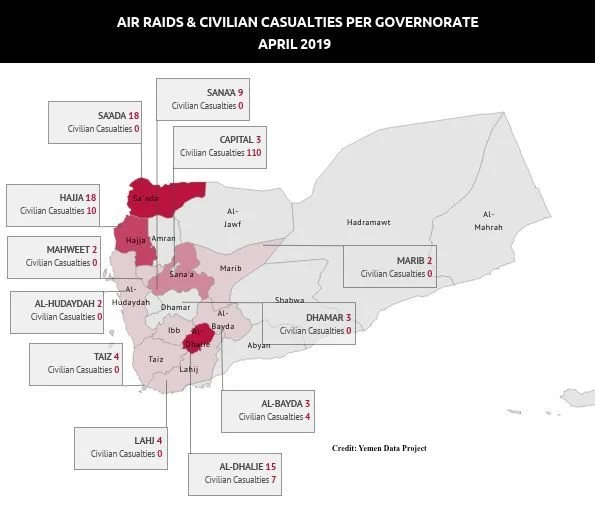YEMEN DATA PROJECT
DECEMBER 08, 2018
Technologically advanced weaponry inflicts mass casualties on an almost daily basis in Yemen in one of the deadliest conflicts in modern Middle East history.
Data from the Yemen Data Project shows that bombers time their attacks to inflict maximum destruction. According to the data collected by the project, over twice as many bombings occur in the afternoon and evening than in the morning hours and four times as many bombings are carried out by Saudi forces than Houthi rebels.
Najam Haider, Associate Professor of Religion at Columbia University and Yemen expert, postulates the Arab states detonate most of their bombs during the afternoon and evening because that is when Yemenites are leaving work and school to head home and to mosque and are thus most vulnerable.
“They want to kill as many Houthis as possible,” says Haider. “So the Arabs set off the bombs when they know many Houthis will be out – which is in the afternoon and evening,”
These afternoon and evening attacks show no sign of slowing down. In fact, according to the data, afternoon and evening attacks are becoming more frequent and have steadily increased since 2016.
Unfortunately, the data from the project fails to record the number of casualties from the attacks. However, the United Nations has kept astute records. Since 2015, the United Nations estimates the Yemen bombings have killed 13,600 people – more than 5,200 of whom were civilians. The United Nations also estimates more than 50,000 people have died in Yemen as the result of famine caused by the ongoing conflict.
Despite these alarming and heartbreaking statistics, the world sits back and does nothing. Tens of thousands of innocent people are dying because traditional “peace-keeping” nations are afraid to get involved due to political (aka oil) reasons.
Ishac Diwan, Visiting Professor of International and Public Affairs at Columbia University and Middle East economics expert thinks the whole situation is a tragedy that will perpetually repeat itself.
“The Arabs and the Houthis hate each other,” says Diwan. “They will never stop fighting permanently. If the economy let them, they would completely wipe each other out.”
According to Diwan, it’s the economy – or lack thereof – that will end make this most recent conflict in Yemen stop.
“Yemen is a very poor country,” says Diwan. “So soon they will stop fighting because the country can’t afford to keep fighting. As soon as they save up money, the fighting will commence again.”
But until the money runs out the bombings will continue. Arab forces detonate over 70% of the bombs. Such discrepancy in bombing power is due to the fact the Arabs are extremely well funded compared to the rebels. A direct result of this lack of rebel funding and surplus of funding among Arab forces is a huge variation in death rates. According to the United Nations, more than half the civilian causalities in Yemen have been suffered among the Houthi rebels. The United Nations Human Rights Council calls these civilian deaths an “unrelenting violation of international humanitarian law.”

